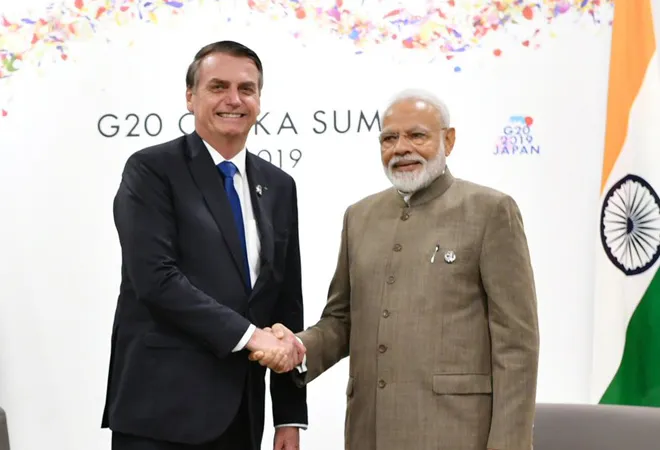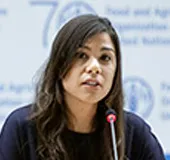-
CENTRES
Progammes & Centres
Location
The upcoming visit of the President of Brazil for the Republic Day may offer a platform to forge a close friendship between the leaders of these two large nations.

At the dawn of 2019, Brazil’s Foreign Minister, Ernesto Araújo vowed to strengthen ties with like-minded countries whose leaders shared President Jair Bolsonaro’s ideology, such as Israel, Italy, Hungary, Poland and especially the U.S.
One year on, it is clear that Trump has not reciprocated Bolsonaro’s outreach. Major decisions between Brasilia and Washington such as Trump’s promise of opening the American market to Brazilian beef are yet to materialize as he threatened to impose tariffs on Brazilian steel. Meanwhile, Israel’s Prime Minister Benjamin Netanyahu is embroiled in corruption scandals at home and struggling to keep his seat in the third election in less than a year. The far-right party League and its firebrand leader Matteo Salvini were ousted from the governing coalition in Italy by an unlikely party alliance last September.
Bolsonaro’s mishandling of the fires in the Amazon rainforest did not help his popularity across the world. It escalated into a personal spat with Emmanuel Macron, in which even the French President’s wife was not spared from offenses. As 2020 starts, Bolsonaro is in dire need of new friends and alliances. Indian Prime Minister Narendra Modi’s invitation to Bolsonaro to be the chief guest at this year’s Republic Day is therefore timely.
For the Brazilian President, this is a significant opportunity. He understands the honor of this invitation and is organizing what will be the largest ever bilateral visit of Brazil to India. A high-level delegation of 6 State Ministers and around 70 business leaders is expected to land in New Delhi.
India and Brazil are natural powerhouses: They represent the second and sixth most populous countries in the world and the fifth and ninth largest economies respectively. They are also leading voices in their region and active players in the global arena. However, their challenges are just as vast; with over 20% of their populations under the poverty line, both nations have a long way to go to build societies that are more just.
Determined to strengthen the ties, Brazil and India elevated their bilateral relations to a strategic partnership in 2006. At the time, they envisioned that, as emerging nations from the Global South, they could join hands to reform the international order and no longer play a peripheral role, but sit as equals at main global decision-making bodies. This shared geopolitical vision was also the driving force behind the plurilateral arrangements both countries helped to forge together, such as BRICS, IBSA and the G-4.
A lot has changed since then. In a world order undergoing profound transformations, Modi’s India and Bolsonaro’s Brazil have developed different worldviews and strategies to cope with this changing reality. Under Modi, India’s active foreign policy has become more assertive in its objective of positioning the country as a leading global player, leveraging its hard and soft power. Bolsonaro took a different turn.
After one year in power, Bolsonaro’s foreign policy has been marked by his unilateral alignment to the U.S. and his Foreign Minister’s ideological war against so-called “globalism”. Viewing Brazil as fundamentally part of a Western civilization, the Brazilian top diplomat is more concerned about reviving what he believes is the true identity of the West – conservatism and Christianity – than with the world’s geopolitical balance of power.
How does India fit into this worldview?
So far, Bolsonaro’s foreign policy was unable to articulate a coherent strategy towards Asia, let alone to India. However, we can expect pragmatism to prevail over ideology in Brazil’s approach to the Indian subcontinent.
Apart from new friends, Bolsonaro needs to promote trade and investment to boost Brazil’s sluggish economy, expand business opportunities for his liberal base, foster technological development and diversify partnerships. He also needs to show concrete results at home, as his approval rate has plummeted to 30% with only one year in office. Keeping this in mind, charming Bolsonaro shall not be a hard task for the Indian Prime Minister.
For Modi, Brazil can be a powerful ally in the international arena, as India positions itself as a global leader. As the largest economy in Latin America and main partner of India in the region, Brazil offers a big market for a wide variety of Indian manufactured goods, a port of entry to the subcontinent and a large supply of natural resources. It can also assist India in meeting its target of 175 GW power generation from renewable energy sources, given its experience in bio-fuels, including the most advanced ethanol program in the world.
What both leaders certainly do not need is another country criticizing their domestic policies, be it Bolsonaro’s environmental negligence or Modi’s policies towards Jammu and Kashmir. This should not be a problem: no one want to throw stones from a glass house. Domestically, they also represent similar values: Bolsonaro’s nationalist, conservative and populist agenda bears clear resemblance to Modi’s Hindutva.
While Brazil’s and India’s leaders may no longer share the same geopolitical vision as before, they do have several converging interests. Bolsonaro’s visit will shape these interests into the new basis of a revived strategic partnership and place both countries higher in their respective foreign policy agenda. Furthermore, given the similarities of their leadership style and values, it might well be the start of a close friendship.
During Bolsonaro’s 4-day stay in Delhi, Brazil and India shall adopt an Action Plan, with concrete policies to be carried forward in several areas of cooperation to strengthen the strategic partnership. They are also expected to sign a total of 20 bilateral agreements (including those among public and private institutions) in a wide range of sectors, such as bio-energy, cybersecurity, culture, double taxation, investment, health and medicine, science and technology, oil and gas and so on.
Particularly noteworthy is the treaty on investment cooperation and facilitation. After doing away with over 50 bilateral investment treaties a few years back, this is the first time India will sign such an instrument. Based on a new model, the agreement does not foresee the investor-state dispute settlement clause (a requirement for bilateral treaties with capital-exporting developed countries which both Brazil and India deemed harming for the regulatory role of the State). Instead, this groundbreaking agreement establishes an innovative mechanism intended to deal with conflicts and disputes between foreign investors and the host state without international arbitration. It is an important advancement, given that Indian foreign direct investments in Brazil are estimated at around USD $6 billion and Brazilian investments in India are only slightly over USD $1 billion.
Bilateral trade and economic integration will also get an extra push, with a one-day business forum intended to connect the private sector from both sides and promote potential areas for increased exchange. While total trade is significant today – around USD $7.6 billion – it is still a far cry from its potential given the size of both economies and stands well below its peak of USD 11 billion in 2014. Moreover, while Indian exports are rather diversified, Brazilian exports to India are mainly concentrated in oil, soya oil and sugar. Expanding trade and diversifying it shall be among the main challenges to address. Increased cooperation on science and technology as well as on defense are also promising areas, especially given Brazil’s relevant defense industry and the fact that India is the largest importer of military equipment in the world.
Finally, in the sector of bio-fuels, it is important to highlight that further collaboration with the Brazilian sugar cane-based ethanol industry may help pave the way to finding a mutually agreed solution for Brazil’s complaints about Indian sugar subsidies under the World Trade Organization.
While the presidential visit can open large avenues of cooperation, the challenge will rest on keeping the momentum and following it up, so that this 14-year old strategic partnership can at last translate into wide and concrete collaboration. Implementing the Action Plan as well as the bilateral agreements will require continued efforts of mobilization of public and private actors to produce the medium-term results. It is to be seen if both countries will have the bandwidth to go forward and fulfill the promises of this new friendship.
The views expressed above belong to the author(s). ORF research and analyses now available on Telegram! Click here to access our curated content — blogs, longforms and interviews.

Candice Vianna is a researcher in a non-profit organization in India and has worked as a Brazilian diplomat for 11 years. She holds a Masters ...
Read More +